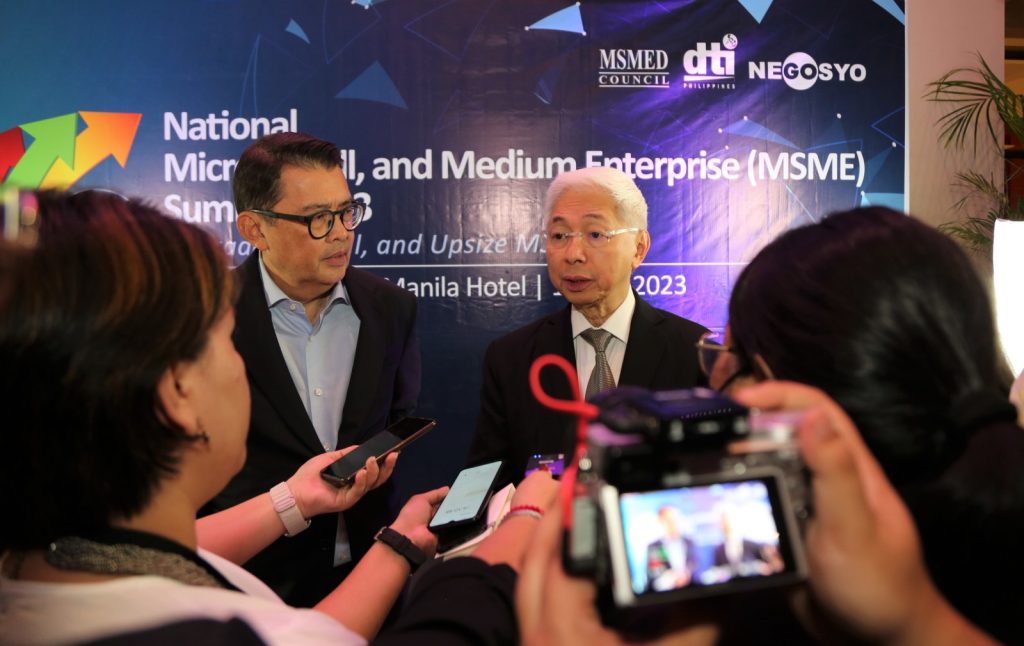
VP Duterte Explore Entrepreneurship Training for Senior High
October 20, 2023
Growing The Next Generation of Filipino Entrepreneurs
October 30, 2023
Incentivizing Inclusive Business Models
In my recent meeting with the Department of Trade and Industry (DTI) led by Secretary Fred Pascual, we explored how we can incentivize large private corporations to adopt inclusive business models. Our aim is to contribute to driving sustainable and inclusive economic development, with the help of private sector participation in micro, small and medium-sized enterprise (MSME) programs and activities.
The core of our conversation revolved around updating government policies implemented back in 2017, which were included in the 2017-2019 Investment Priorities Plan (IPP). We recognized the need to make these policies more appealing to companies, encouraging them to adopt business models that extend meaningful benefits to a broader cross-section of the population.
It was quite a productive discussion. I, for one, was confident that the Kapatid Angat Lahat sa Agri Program (KALAP) could promote inclusive business models among large agriculture companies. Inclusivity is built into the business models adopted by our big-brother companies in KALAP because the program hinges on integrating small farmers and fisherfolk into the value chain of the large corporations. KALAP represents a golden opportunity to reinvigorate the promotion of inclusive business models as the success stories among them already are proof that an inclusive business model works.
Fortunately, existing government policies already offer incentives for such models. The 2017-2019 IPP identifies activities eligible for fiscal and non-fiscal incentives. These policies have the potential to nurture a conducive environment for inclusive businesses and persuade more enterprises to incorporate inclusive models into their operations. The DTI’s Board of Investments spearheaded this initiative, while the ASEAN Business Advisory Council Philippines, where I sit as chairman, also contributed to forming policies.
During our discussions with Sec. Fred, private sector involvement emerged as a central theme. We identified key areas for collaboration. One such initiative involves more frequent consultations with the private sector regarding programs and activities of the MSME Development Council, where I serve as Luzon vice chair. This alignment is expected to be instrumental in advancing MSME development. Additionally, our common vision encompasses promoting job creation by attracting increased investments to the Philippines from overseas-based companies.
I was also delighted to share with the DTI that two prominent women’s business groups in the Philippines have committed to collaborate in preparation for the country’s chairmanship of ASEAN in 2026. Our goal is to emphasize the pivotal role women entrepreneurs play in the national and regional economy. With hope, this united front will encourage more women’s organizations across the Philippines to join us in the run-up to the Philippines’ chairmanship of the ASEAN in 2026. I imagine it would be quite an accomplishment for the Philippines to leave women’s entrepreneurship as one of its legacy projects.
Our collaborative efforts with the DTI present a promising path toward the adoption of inclusive business models. Through our successful collaborations such as the mentoring programs KMME, KAMMP and 3M on Wheels, we have already proven that, together, the government and private sector can accomplish so much more than they could by themselves. By encouraging businesses to play a more active role and purposely designing their way of doing business to benefit more members of the community, we all stand to benefit.
In the pursuit of this collaborative vision, businesses must recognize that inclusive business models are not just a corporate strategy but a catalyst for societal transformation. Our shared efforts strive to address the disparities that have long hindered the full realization of economic potential within our nation.
By fostering inclusive business models, we aim to break down the barriers that often keep smaller enterprises on the fringes. We are dedicated to providing them with a place at the table, enabling them to thrive alongside larger corporations. This inclusivity isn’t just a matter of policy; it’s a commitment to creating an economic ecosystem where every Filipino entrepreneur has a fair shot at success.
These discussions are only the beginning. As we update policies and refine strategies, we look forward to the day when more of us in the private sector actively embrace inclusive business models. I think we can all agree that we all want a future where sustainable development is not just a catchphrase, but a reality that enriches the lives of countless Filipinos.
The Philippines’ path to chairing ASEAN in 2026 is an exciting opportunity for our nation to lead by example and champion inclusivity on a regional scale, starting with KALAP. By elevating women entrepreneurs and emphasizing their pivotal role, we hope to inspire positive change throughout ASEAN and make inclusivity the central theme of the legacy we would like to contribute from our chairmanship.
Fostering inclusive business models should be a shared commitment, one that transcends political boundaries and individual interests. Together with the government agencies who have continued to support the entrepreneurship advocacy – the DTI, the Department of Agriculture, the many local government units who welcomed our mentoring roadshows, the Department of Education and most especially the big-brother companies – we continue to set a conducive environment to create an economic landscape where no one is left behind. As we move forward, our journey toward inclusive business models must always be built upon our collective wish for a brighter, more equitable future for the Philippines.

2/F RFM Corporate Center, Pioneer cor. Sheridan Sts. Mandaluyong City, Metro Manila, Philippines

